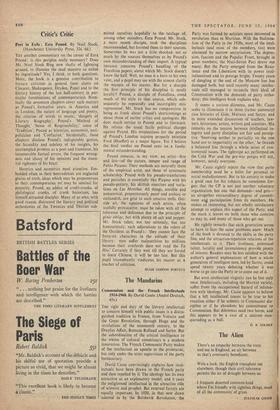The Mandarins
THE right and duty of the literary intellectual to concern himself with public issues is a distin- guished tradition in France, from Voltaire and the Great Revolution, through Hugo and the revolutions of the nineteenth century, to the Dreyfus Affair, Romain Rolland and Sartre. But the subordination of the critical intelligence to the whims of cultural commissars is a modern innovation. The French Communist Party makes of the intellectual an apostle to the proletariat, but only under the strict supervision of the party bureaucracy.
David Caute convincingly explains how intel- lectuals have been drawn to the French party and then repelled by it. The ideology has its own attraction as an explanatory model, and it casts the enlightened intellectual in the attractive role of scientist and prophet. But external factors are equally important. In 1920, in that new dawn ushered in by the Bolshevik Revolution, the
Party was formed by activists more interested in revolution than in Marxism. With the Stalinisa- tion of the Party in the 1920s, most of the intel- lectuals (and most of the members, too) were alienated by narrow sectarianism. The depres- sion, fascism and the Popular Front, brought in great numbers; the Nazi-Soviet Pact drove out many. But the Party emerged from the Resis- tance and the Liberation with its power insti- tutionalised and its prestige bright. Twenty years of dangling at the end of the Moscow line has damaged both, but until recently many intellec- tuals still managed to reconcile their ideal of Communism' with the demands of party ortho- doxy; this intelligent book explains why.
It seems a curious dilemma, and Mr. Caute seeks to illuminate it in three (rather summary) case histories of Gide, Malraux and Sartre, and in more extended discussions of teachers, law- yers, historians, artists, writers and scientists. His remarks on the tension between intellectual in- tegrity and party discipline are fair and percep- tive, `Swerving neither to partiality on the one hand nor to impartiality on the other,' he threads a balanced line through a whole series of con- troversial issues. The tightrope act performed on the Cold War and the pre-war purges will not, however, satisfy everyone.
Mr. Caute rightly rejects the view that party membership need be a balm for personal or social maladjustment. Bu•t in his anxiety to make a good case for his subjects he sometimes for- gets that the CP is not just another voluntary organisation, but one that demands—and gets— an altogether extraordinary degree of commit- ment wag participation from its members. He makes an interesting, but not wholly satisfactory attempt to explain this aspect of the Party, and the mark it leaves on both those who contrive to stay in, and many of those who get out.
He rightly remarks that each generation seems to have to face the same problems anew. Much of the book is devoted to the shifts in the party line, and the attraction-repulsion relations of the intellectuals to it. Their liveliness, polemical talent, lucidity and inconsistency provide plenty of interest. Readers may be less satisfied with the author's general explanations of how a whole generation of intelligent men, led by Sartre, could spend twenty years debating whether it was worse to go into the Party or to come out of it.
But even intellectual virginity can be lost only once. Intellectuals, including the Marxist variety, suffer from the occupational hazard of infatua- tion with ideology. Mr. Caute appears to believe that a left intellectual ceases to be true to his vocation either if he submits to Communist dis- cipline or if he abandons his commitment to Communism. But dilemmas need two horns, and this appears to be a case of a unicorn mas- querading as a bull.
D. B. GOLDEY


































 Previous page
Previous page